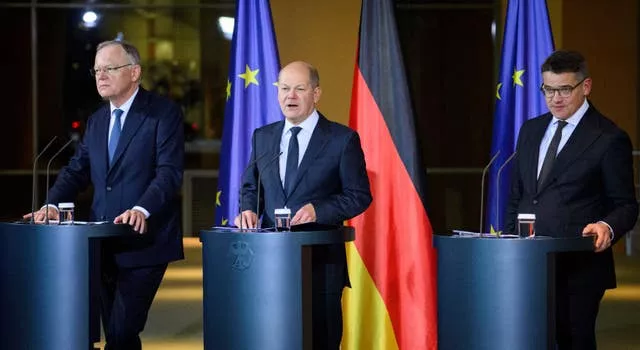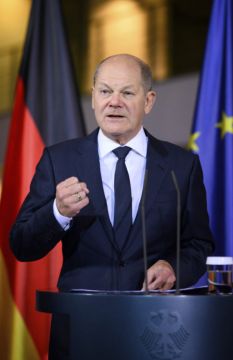Chancellor Olaf Scholz and Germany’s 16 state governors have agreed on new and stricter measures to curb the high number of migrants flowing into the country, reaching a compromise on an issue that has become a huge political problem for the government and a hot topic in society.
The new measures include speeding up asylum procedures, benefit restrictions for asylum-seekers, and more financial aid from the federal government for the states and local communities dealing with the influx.
Speaking on Tuesday after an overnight meeting that lasted several hours, Mr Scholz, a Social Democrat who leads a centre-left government, called the agreement “a historical moment” – a remark that showed how much of a burden the topic had become for the government.

The number of new asylum applications for the year to date was around 73% higher at the end of September than in the same period last year, official statistics show.
Shelters for migrants and refugees have been filling up in Germany for months, and the Chancellor, who faces enormous pressure from the opposition and elsewhere to halt that trend, has said “too many are coming”.
Germany has also taken in more than a million Ukrainians since the start of Russia’s war in their homeland.
Over recent weeks, there has been a flurry of government activity, including legislation to ease deportations of unsuccessful asylum-seekers, to stiffen punishment for smugglers, to allow asylum-seekers to start working sooner, and to introduce temporary checks on the Polish, Czech and Swiss borders.
The federal and state governments agreed on Tuesday to change the system for financing the costs for the asylum seekers.
Starting next year, the federal government will pay an annual lump sum of 7,500 euros (£6,500) for each asylum seeker and no longer a total annual sum of around 3.7 billion euros (£3.2 billion).

Mr Scholz called the reform a “transition to a breathing system” and said that “with rising numbers, there is more money, with falling numbers there is less”.
Asylum-seekers are also to receive at least part of their benefits as credit on a payment card, meaning they will get less cash in the future.
Some state governors had called for a new system of conducting asylum procedures outside of Germany to stop the migrants arriving in the first place, but that measure did not pass. However, the federal government said it will examine whether asylum procedures outside the EU are possible.
Several European countries, including the United Kingdom and Denmark, have been looking into processing asylum-seekers remotely to prevent them entering their countries.
But so far, only Italy has successfully reached a deal – with Albania on Monday – to give temporary shelter to some of the thousands of migrants who reach Italian shores, while their asylum bids are being processed.
In other measures, asylum procedures are to be processed faster than before, and asylum applications from people coming from countries with a recognition rate of less than 5% are to be completed within three months.

The controls that Germany established at its borders with Switzerland, the Czech Republic, Poland and Austria are to be extended, but the time period was not clear.
Opposition leader Friedrich Merz, from the centre-right Christian Democratic Union, rejected Mr Scholz’s claim that the migration deal is “historic”.
“I expressly disagree with the categorisation as historical. It was a step forward,” he told reporters in Berlin on Tuesday.
“The decisive factor is that the figures have to come down,” he added. “And I have a big question mark over whether they will actually go down with these measures.”
More than 250,000 people applied for asylum in Germany in the period from January to September, compared with more than 130,000 in the same time period last year.
The majority of asylum seekers come from Syria, Afghanistan and Turkey.







